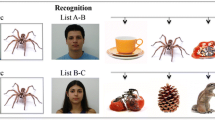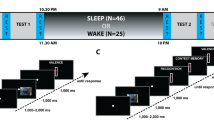Abstract
Background
Emotions modulate memory. It has been suggested that sleep contributes to improved memory of emotional events by preferentially consolidating emotional memories, presumably because of a selective off-line reactivation of information relevant to future behavior.
Objectives
We aimed to validate sleep-dependent memory consolidation in a new associative emotional memory paradigm suitable for inducing memory reactivations during sleep. We hypothesized that sleep preferentially might benefit the consolidation of emotional associations independently of their negative vs positive emotional valence.
Methods
Seventy-two healthy young participants performed an associative emotional memory task in either the evening or the morning. During the task, they were asked to associate neutrally spoken words to neutral, negative or positive pictures. Cued recall was tested after a 12-h retention interval filled with either night-time sleep or daytime wakefulness.
Results
Generally, emotional associations were better remembered than neutral ones. However, we were not able to replicate a selective benefit of sleep on emotional memory. Sleep robustly improved the cued recall performance of all picture types compared with wakefulness, without any modulating influence of emotional arousal or valence.
Conclusions
We conclude that the consolidation of explicitly learned associations benefits from sleep, independent of emotional arousal or valence. Selective emotional memory consolidation during sleep may be restricted to non-associative item memory or incidentally learned emotional associations.
Zusammenfassung
Hintergrund
Emotionen beeinflussen die Gedächtnisbildung. Es wird angenommen, dass die Gedächtniskonsolidierung im Schlaf zu diesem Effekt beiträgt und im Schlaf insbesondere emotionale Erinnerungen gefestigt werden. Dies geschieht möglicherweise über eine selektive Reaktivierung von zukunftsrelevanten Informationen.
Ziel der Arbeit
Das Ziel der Studie ist es, die schlafabhängige Gedächtniskonsolidierung eines neuen emotionalen Assoziationsparadigma zu validieren. Das Lernparadigma wäre zukünftig für die experimentelle Reaktivierung emotionaler Assoziationen im Schlaf geeignet. Die Hypothese lautet, dass sowohl negative als auch positive emotionale Assoziationen während des Schlafs bevorzugt gefestigt werden im Vergleich zu neutralen Assoziationen.
Material und Methoden
72 gesunde Versuchspersonen durchliefen entweder am Abend oder am Morgen eine assoziativ-emotionale Gedächtnisaufgabe. Dabei mussten neutrale gesprochene Wörter mit negativen, positiven oder neutralen Bildern assoziiert werden. Der Abruf wurde nach einer 12-stündigen Zeitspanne getestet, in der die Versuchspersonen entweder nachts schliefen oder tagsüber wach bleiben mussten.
Ergebnisse
Emotionale Assoziationen konnten allgemein besser erinnert werden als neutrale. Wir konnten jedoch nicht die selektive Verstärkung emotionaler Inhalte im Schlaf replizieren. Die Schlafgruppe zeigte insgesamt eine bessere Erinnerungsleistung als die Wachgruppe, unabhängig von der emotionalen Erregung und Valenz der gelernten Assoziationen.
Diskussion
Unsere Ergebnisse zeigen, dass im Schlaf explizit gelernte Assoziationen unabhängig von Faktoren wie emotionaler Erregung oder Valenz gefestigt werden. Die präferentielle Konsolidierung von emotionalen Inhalten im Schlaf scheint möglicherweise nur auf nicht-assoziative Gedächtnisinhalte und inzidentell gelernte Assoziationen beschränkt zu sein.


Similar content being viewed by others
References
Ackermann S, Hartmann F, Papassotiropoulos A et al (2015) No associations between interindividual differences in sleep parameters and episodic memory consolidation. Sleep 38:951–959. doi:10.5665/sleep.4748
Baran B, Pace-Schott EF, Ericson C, Spencer RMC (2012) Processing of emotional reactivity and emotional memory over sleep. J Neurosci 32:1035–1042. doi:10.1523/JNEUROSCI.2532-11.2012
Chambers AM, Payne JD (2014) Laugh yourself to sleep: Memory consolidation for humorous information. Exp Brain Res 232:1415–1427. doi:10.1007/s00221-013-3779-7
Cunningham TJ, Crowell CR, Alger SE et al (2014) Psychophysiological arousal at encoding leads to reduced reactivity but enhanced emotional memory following sleep. Neurobiol Learn Mem 114:155–164. doi:10.1016/j.nlm.2014.06.002
Diekelmann S, Born J (2010) The memory function of sleep. Nat Rev Neurosci 11:114–126. doi:10.1038/nrn2762
Diekelmann S, Wilhelm I, Born J (2009) The whats and whens of sleep-dependent memory consolidation. Sleep Med Rev 13:309–321. doi:10.1016/j.smrv.2008.08.002
Fischer S, Born J (2009) Anticipated reward enhances offline learning during sleep. J Exp Psychol Learn Mem Cogn 35:1586–1593. doi:10.1037/a0017256
Groch S, Wilhelm I, Diekelmann S et al (2011) Contribution of norepinephrine to emotional memory consolidation during sleep. Psychoneuroendocrinology 36:1342–1350. doi:10.1016/j.psyneuen.2011.03.006
Groch S, Wilhelm I, Diekelmann S, Born J (2013) The role of REM sleep in the processing of emotional memories: evidence from behavior and event-related potentials. Neurobiol Learn Mem 99:1–9. doi:10.1016/j.nlm.2012.10.006
Groch S, Zinke K, Wilhelm I, Born J (2014) Dissociating the contributions of slow-wave sleep and rapid eye movement sleep to emotional item and source memory. Neurobiol Learn Mem 122:122–130. doi:10.1016/j.nlm.2014.08.013
Holland P, Lewis PA (2007) Emotional memory: Selective enhancement by sleep. Curr Biol 17:179–181. doi:10.1016/j.cub.2006.12.033
Hu P, Stylos-Allan M, Walker MP (2006) Sleep facilitates consolidation of emotional declarative memory. Psychol Sci 17(10):891–898. doi:10.1111/j.1467-9280.2006.01799.x
Kaestner E, Wixted J, Mednick S (2013) Pharmacologically Increasing Sleep Spindles Enhances Recognition for Negative and High-arousal Memories. J Cogn Neurosci 25(10):1597–1610. doi:10.1162/jocn_a_00433
Kensinger EA (2009) Remembering the details: Effects of emotion. Emot Rev 1(2):99–113. doi:10.1177/1754073908100432
LaBar KS, Cabeza R (2006) Cognitive neuroscience of emotional memory. Nat Rev Neurosci 7:54–64. doi:10.1038/nrn1825
Lansink CS, Goltstein PM, Lankelma JV et al (2008) Preferential reactivation of motivationally relevant information in the ventral striatum. J Neurosci 28:6372–6382. doi:10.1523/JNEUROSCI.1054-08.2008
Lansink CS, Goltstein PM, Lankelma JV et al (2009) Hippocampus leads ventral striatum in replay of place-reward information. PLoS Biol7(8):e1000173. doi:10.1371/journal.pbio.1000173
Lara-Carrasco J, Nielsen TA, Solomonova E (2009) Overnight emotional adaptation to negative stimuli is altered by REM sleep deprivation and is correlated with intervening dream emotions. J Sleep Res 18:178–187. doi:10.1111/j.1365-2869.2008.00709.x
Marchewka A, Zurawski L, Jednoróg K, Grabowska A (2014) The Nencki Affective Picture System (NAPS): Introduction to a novel, standardized, wide-range, high-quality, realistic picture database. Behav Res Methods 46:596–610. doi:10.3758/s13428-013-0379-1
Martínez-Galindo JG, Cansino S (2015) Positive and negative emotional contexts unevenly predict episodic memory. Behav Brain Res 291:89–102. doi:10.1016/j.bbr.2015.05.018
McGaugh JL (2004) The amygdala modulates the consolidation of memories of emotionally arousing experiences. Annu Rev Neurosci 27:1–28. doi:10.1146/annurev.neuro.27.070203.144157
Nishida M, Pearsall J, Buckner RL, Walker MP (2009) REM sleep, prefrontal theta, and the consolidation of human emotional memory. Cereb Cortex 19:1158–1166. doi:10.1093/cercor/bhn155
Oudiette D, Antony JW, Creery JD, Paller KA (2013) The role of memory reactivation during wakefulness and sleep in determining which memories endure. J Neurosci 33:6672–6678. doi:10.1523/JNEUROSCI.5497-12.2013.The
Pace-Schott EF, Shepherd E, Spencer RMC et al (2011) Napping promotes inter-session habituation to emotional stimuli. Neurobiol Learn Mem 95:24–36. doi:10.1016/j.nlm.2010.10.006
Payne JD, Kensinger EA (2010) Sleep’s role in the consolidation of emotional episodic memories. Curr Dir Psychol Sci 19(5):290–295. doi:10.1177/0963721410383978
Payne JD, Kensinger EA, Wamsley EJ et al (2015) Napping and the selective consolidation of negative aspects of scenes. Emotion 15(2):176–186
Payne JD, Stickgold R, Swanberg K, Kensinger EA (2008) Sleep preferentially enhances memory for emotional components of scenes. Psychol Sci 19:781–788. doi:10.1111/j.1467-9280.2008.02157.x
Rasch B, Born J (2013) About sleep’s role in memory. Physiol Rev 93:681–766. doi:10.1152/physrev.00032.2012
Sharot T, Verfaellie M, Yonelinas AP (2007) How emotion strengthens the recollective experience: a time-dependent hippocampal process. PLoS One 2(10):e1068 doi:10.1371/journal.pone.0001068
Sharot T, Yonelinas AP (2008) Differential time-dependent effects of emotion on recollective experience and memory for contextual information. Cognition 106:538–547. doi:10.1016/j.cognition.2007.03.002
Wagner U, Fischer S, Born J (2002) Changes in emotional responses to aversive pictures across periods rich in slow-wave sleep versus rapid eye movement sleep. Psychosom Med 64:627–634. doi:10.1097/01.PSY.0000021940.35402.51
Wagner U, Gais S, Born J (2001) Emotional memory formation is enhanced across sleep intervals with high amounts of rapid eye movement sleep. Learn Mem 8:112–119. doi:10.1101/lm.36801
Wagner U, Hallschmid M, Rasch B, Born J (2006) Brief sleep after learning keeps emotional memories alive for years. Biol Psychiatry 60:788–790. doi:10.1016/j.biopsych.2006.03.061
Walker MP, van der Helm E (2009) Overnight therapy? The role of sleep in emotional brain processing. Psychol Bull 135:731–748. doi:10.1037/a0016570
Walker MP, Stickgold R (2010) Overnight alchemy: sleep-dependent memory evolution. Nat Rev Neurosci 11:218 (author reply 218) doi:10.1038/nrn2762-c1
Wilhelm I, Diekelmann S, Molzow I et al (2011) Sleep selectively enhances memory expected to be of future relevance. J Neurosci 31:1563–1569. doi:10.1523/JNEUROSCI.3575-10.2011
Acknowledgements
We thank Donata Schmid, Laura Jagoda, and Arndt Schaefer for their help in data collection.
Author information
Authors and Affiliations
Corresponding author
Ethics declarations
Conflict of interest
M. Lehmann, E. Seifritz, and B. Rasch declare that they have no competing interests.
All procedures performed in studies involving human participants were in accordance with the ethical standards of the institutional and/or national research committee and with the 1964 Helsinki declaration and its later amendments or comparable ethical standards. Informed consent was obtained from all individual participants included in the study.
Additional information
This work was supported by grants from the Swiss National Foundation (SNF) (PP00P1_133685 and 100014_162388) and the Clinical Research Priority Program “Sleep and Health” of the University of Zurich.
Rights and permissions
About this article
Cite this article
Lehmann, M., Seifritz, E. & Rasch, B. Sleep benefits emotional and neutral associative memories equally. Somnologie 20, 47–53 (2016). https://doi.org/10.1007/s11818-015-0034-4
Received:
Accepted:
Published:
Issue Date:
DOI: https://doi.org/10.1007/s11818-015-0034-4




